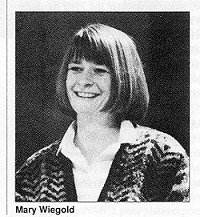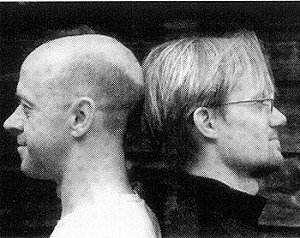This was a 'wheels within wheels' or, in internet terms, a 'links within links' event, bringing together usefully several strands in contemporary British music and music making. In the late '80s Mary Wiegold and John Woolrich conceived together Mary Wiegold's Songbook for soprano with accompaniments by two clarinets and three lower strings (some or all of those). Astonishingly, since then nearly two hundred contributions have been amassed from composers young and old, including Harrison Birtwistle (songs which grew into Pulse Shadows) and the list boasts many famous names from several continents, with recordings on NMC, Metier & Largo.
For its Thursday Night at The Warehouse, we heard a new group of songs for Mary by British composers, mainly world premieres. The Warehouse is a popular venue, and it was a sell-out, with a 'buzz' in the atmosphere. I liked Deborah Pritchard's rapid whip through eight Lear limericks, a clever inverted arch with 'a point of depression' between its energetic start and finish. John McLeod's setting of an old Chinese poem Song of the Concubine is attractive, but he was one of several who were inconsiderate to the singer, with awkward high notes uncalled for by the words. Mary Wiegold is not the possessor of the most alluring of natural voices, but she is 'a good trouper', game to have a go at anything and do her best for it; the result, in concert and on CD, is often very beautiful when the tessitura is right. Julian Grant's The Owl & the Pussy-Cat, a number opera in nine scenes, lacked the compression of Stravinsky's final original work. There were the usual programme changes & it was possible to get a little mixed up. Of two Macedonian born composers, who have studied in London, Nikola Kodjabashia's song had an intricate accompaniment and an uncomfortable vocal line, and Pande Shaov's used refined textures with portamenti and peaceful swaying movements. Tansy Davies Picking Raspberries aimed at a sensual textures to match vivid images in the poem; she made her mark in a group of pieces, which included a substantial wordless 'song' for viola and piano upon a poem about '60s USSR, which was explained & read to us by authoress Ruth Fairlight - it is a policy of The Composers Ensemble to vary Songbook programmes with instrumental pieces, which also provides necessary breaks for the hard-pressed Mary Wiegold.
Tansy Davies is also one of the featured composers in The Hoxton Thirteen (NMC D076), a CD of instrumental compositions by thirteen young composers given at the Brighton Festival and John Woolrich's Hoxton New Music Days in 2000, aiming to give a snapshot of 'some of the most interesting young British composers'. Here the line up, from which the composers could pick and choose, was flute and clarinet, normal string trio, piano and percussion. This instrumentation, however varied, does however tend to a certain sameness and academicism in some of the sequences of short pieces, and it is not a programme to play straight through, nor one upon which it is fair to base a settled view about the individual composers. It gives a feeling for the variety of current idioms and the booklet is well produced, with biographies and educational CVs of each young hopeful, with good photos which could help you recognise some of them at BMIC new music concerts.
The 1991 release of Mary Wiegold's Songbook (NMC D003) features many of the middle generation of leading British composers from Birtwistle Bainbridge and Weir to Skempton, Bedford and Nyman, two items by Colin Mathews (NMC's Executive Producer) and the songs interspersed by Dowland arrangements by John Woolrich. It is uneven, but there are a sufficient number of well-instrumented and well sung short works to make it a desirable acquisition for those who would be interested to join in celebration of an unique enterprise, a song collection which has grown beyond reasonable expectation without commissioning, 'yet contributors have needed little persuasion'; an inspiriting demonstration of the vitality of Britain's affordable, small-scale new music life.
This important series of BMIC concerts continues at The Warehouse with the Delta Saxophone Quartet on Thursday 8 November at 7.30, ending on 13 December with A Quiet Evening with Richard and Chris an enticing programme of percussion duos (full details on http://www.bmic.co.uk.) Last year, I reviewed their appearance in The Cutting Edge 2000 series, writing 'Yes, modern music can be fun without descending to minimal simplicity'.
Peter Grahame Woolf


 Return to:
Return to: